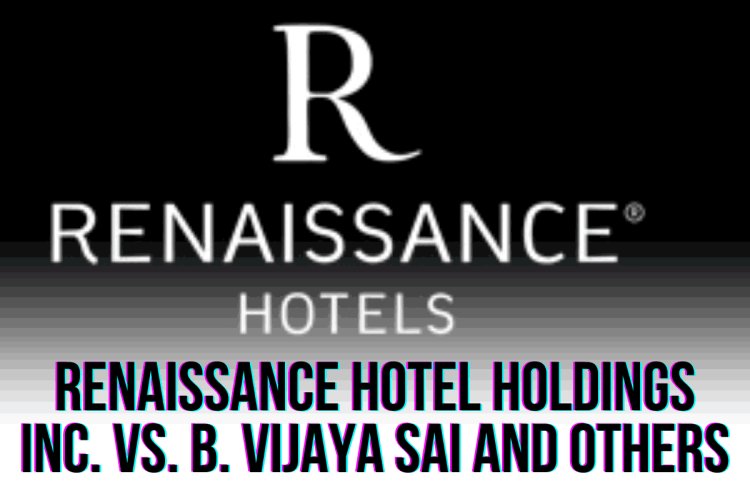RENAISSANCE HOTEL HOLDINGS INC. v. B. VIJAYA SAI AND OTHERS
The legal case between Renaissance Hotel Holdings Inc. and the respondents centers on the use of the trade name "SAI RENAISSANCE" by the respondents, which closely resembles the appellant's trademark "RENAISSANCE" in the hospitality sector. The appellant sought a permanent injunction against the respondents for trademark infringement. While the Trial Court partially favored the appellant, the Karnataka High Court dismissed the case due to insufficient evidence. However, the Supreme Court upheld the appellant's claim, emphasizing the similarity between the marks and the defendants' liability for infringement.

RENAISSANCE HOTEL HOLDINGS INC. v. B. VIJAYA SAI AND OTHERS
CIVIL APPEAL NO. 404 OF 2022
Decided on 19 January 2022
BRIEF FACTS:
The case revolves around a dispute between Renaissance Hotel Holdings Inc., a state-owned company by the State of Delaware, United States of America and the respondents who operate two hotels in Bangalore and Puttaparthi under the trade name "SAI RENAISSANCE". The issue at hand is the appellant's claim for a permanent injunction against the respondents, prohibiting them from using the name "SAI RENAISSANCE". This name is identical to the name used by the appellants and the services offered are similar to those of the appellants.
Initially, the Trial court partially allowed the complaint in favour of the complainants. However, the Karnataka High Court had a different take on the matter, based on the lack of evidence to find the defendants guilty of infringing the plaintiff's mark. The case was then taken to the Apex court for final judgment.
CONTENTIONS OF THE PLAINTIFF:
The plaintiff has claimed that they hold the trademark and service mark "RENAISSANCE" in the hospitality sector, operating in Class 42. They have a strong presence in the market and have expanded their reach to Class 16 as well. The plaintiff is recognized as the world's largest and leading platform for hotel chains and has been operating under the trade name "RENAISSANCE" since 1990. They also hold the registration of the domain name www.renaissancehotels.com, which is used for various promotional activities.
The plaintiff has discovered that the defendant is using the trade name "SAI RENAISSANCE," which is similar to the plaintiff's trademark. The defendant is using this trade name for goods and services. The plaintiff is seeking to protect their registered mark and is concerned that if the defendant is not restrained from continuing to use this name, it would result in a serious violation of their rights.
CONTENTIONS OF THE DEFENDANT:
The defendant in the case argued that the term "RENAISSANCE" is a generic word and cannot be exclusively claimed by anyone. They claimed to be unaware of the plaintiff's use of the disputed trade name, and therefore could not be accused of infringing on a well-known trademark. They explained that they chose the trade name "SAI RENNAISSANCE" as devotees of Shirdi Sai Baba and Shri Puttaparthi Sai Baba, with the latter being considered the reincarnation of the former. They have been operating under this name for the past 15 years. They also argued that their services were distinct as they did not serve alcoholic beverages or non-vegetarian food, unlike the plaintiff, which makes it unlikely for customers to confuse the two businesses.
COURT JUDGEMENT:
The appellant's trademark "RENAISSANCE" is registered under Class 16 and Class 42 for hotels and hotel services. The respondents used the mark "SAI RENAISSANCE" in relation to Class 16 and Class 42. Both marks are visually and phonetically similar. Therefore, the case was covered by the provisions of Section 29(2)(c) and sub-section (3) of Section 29 of the Trade Marks Act, 1999. The High Court made a mistake by considering only one condition of Section 30 of the said Act, without fulfilling both conditions. Section 30 requires that the use of the impugned trademark must be in accordance with honest practices in industrial or commercial matters and not take unfair advantage of or be detrimental to the distinctive character or repute of the trademark. The High Court was wrong to interfere with the trial court's well-reasoned order.
The Supreme Court rejected the argument presented by the High Court and emphasized the importance of interpreting legal provisions in their textual and contextual context. Legislative intent must be given considerable weight as it is a crucial aspect of achieving justice through statutory objectives. The Court cited the decision in Reserve Bank of India v. Peerless General Finance and Investment Co. Ltd. and Others to illustrate the importance of not interpreting provisions in isolation, but rather as a whole to understand the intent behind the statute. The Court pointed out critical errors in the High Court's decision and explained the significance of "and" and "or" in interpreting provisions. The Supreme Court appreciated the well-reasoned decision of the Trial Court and held the defendant liable for infringement.
COURT ANALYSIS:
The Supreme Court upheld the claim of Renaissance Hotel Holdings Inc. for a permanent injunction against the respondents in the case of Renaissance Hotel Holdings Inc. vs. B. Vijaya Sai and Others. The dispute was over the use of the trade name "SAI RENAISSANCE" by the respondents, which was found to be identical to the trademark "RENAISSANCE" used in the hospitality sector. The Court found both marks visually and phonetically similar, falling under the provisions of the Trade Marks Act, 1999. The Supreme Court upheld the Trial Court's decision, holding the defendants liable for trademark infringement.












